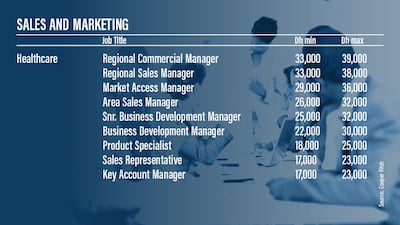Oliver Brinsley, 35, was made redundant in March, just as the world was waking up to the seriousness of the coronavirus pandemic.
The British former consultancy manager quickly arranged a few interviews, and his chances of securing a new role appeared to be good.
But when the full force of the outbreak became apparent, and travel restrictions quickly followed, he found his job opportunities were put on hold.
Many others began to lose their jobs as companies across the globe buckled under the strain of a new economic reality.
Suddenly, the job market became much more crowded. And with a surge in numbers came an inevitable increase in competition.
“I think what you have to do is first of all, is don’t panic,” said David Mackenzie, group managing director for recruitment firm Mackenzie Jones.
“What I would say is, take a week out. Just sit down and go through your CV. Really try to understand what you want to do next."
Mr Mackenzie said in his experience, the first thing many people made redundant tended to do was to email all their contacts to ask for assistance.
He warned against the idea, claiming pausing for thought and working out a proper strategy was a far better bet.
“What you have done [by emailing everyone] is you have blanketed your inbox and you have swiftly become like everyone else who has asked the same question,” he said.
"But there is no depth to your question. Don’t email anyone. Don’t call them about jobs. Understand what you enjoy about your job.”
Mr Mackenzie said a better approach to finding a new job was to begin making a list of suitable companies to target.
He advised against including the biggest multinationals, such as Google or Apple, because so many potential employees would have the same thought.
“If you are HR person, pick the top 20 companies you want to work for, go onto LinkedIn, find the heads of HR, the chief executives, and don’t write to them and say you want a job, write to them and say I really admire your company,” said Mr Mackenzie.
“Say, ‘I like what you have been doing with this project’. Mention something to show you understand what they have been doing.”
Jobseekers should also make sure their LinkedIn profile is up to date and fits the description of roles they are interested in, he said.
Contacting relevant recruitment agencies was also a good idea, but not just by submitting a CV.

“Send an email and say: 'Hi David, things have taken a turn',” Mr Mackenzie said.
“'I am very keen to get your advice on the market. Do you have five minutes when I can just call you?' Don’t attach your CV, because that’s a different approach. I would probably give that person my number.”
The way people present their CV is also crucial, said Claire Donnelly of MHC Consulting, which trains executives in management in Dubai.
“As a HR person, I get that many CVs, I literally look at what I can see on my screen, which is the top half of an A4 piece of paper,” Ms Donnelly said.
“It needs to be something super catchy. They need to have a really good strapline, but it needs to be short, that encapsulates them and what they can bring to the business.
“And what I want to be able to see on that first line is who they work for and what they achieved in that place. It’s all got to be positive, not a cut-and-pasted job description.”
Recruiters also emphasised the importance of being visible on LinkedIn as firms often actively recruited through the site. Building a relationship with employment agencies was essential, too.
“The ones [employees] we place are the ones we have kept in contact with over the last couple of years or the last couple of months, and built a relationship with us,” Mr Mackenzie said.
Mr Brinsley, who is from the UK, was general manager of a consultancy that helped businesses to set up in the Emirates, securing licences and providing accounting. He found himself out of work due to a downturn in the economy and when the business merged with another firm.
He has applied for a number of new positions via LinkedIn, although many firms had not responded.
Since then, he has worked to establish relationships with recruiters that could help to him secure a role.
“It does look like there will be a positive outcome,” he said. “I’m just waiting on a couple of other meetings I’m going to have.
"I hope when this article goes to press I might have something more solid.”























































